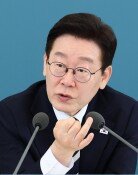Korean Proficiency Test Organized by Civil Groups
Korean Proficiency Test Organized by Civil Groups
Posted May. 13, 2001 07:58,
As the identity crisis of Korean language becomes deepened in the midst of globalization and informationalization, Korean language scholars are carrying forward various Korean language proficiency tests. Korean Language Society’s (Chief Director Huh Ung) Korean Language Proficiency Test (KLPT), and Language & Culture Foundation’s (Chief Director Lee Ghi-Moon) Korean Efficiency Test (KET) are such.
These are not the first Korean language proficiency tests for foreigners and the Koreans residing in overseas. Korea Institute of Curriculum & Evaluation (KICE) has been conducting Korean proficiency tests every year since 1997. The reason why two civil organizations are pushing forward separate tests is that the sense of identity crisis of Korean language is growing in the Korean language academic circle.
Korean language scholars have argued that Korean language proficiency test should be implemented for the examination of the actual condition of the use of Korean language since there are many problems in Korean people’s use of Korean. They also argue that it is necessary to teach correct Korean to foreigners who want to learn Korean and this can be possibly carried through Korean language proficiency test.
Due to this sense of identity crisis, two organizations are preparing Korean language proficiency tests simultaneously, even though they have not discussed this subject matter with each other. However, two tests are very different.
KLPT, which will be conducted in 30 countries on June 2, targets both foreigners and the Koreans residing in overseas. The level of the test is elementary student’s Korean proficiency. Through this test KLS plans to set up the worldwide Korean language teaching standard and to teach the Korean under that standard.
The Koreans residing in overseas welcome this plan. Silly Cone Valley Korean community president, Cho Tae-Sung, who has participated in building an internet ‘Korean Network’, said that ‘Although people want to build the worldwide Korean network, it is difficult to proceed to build the network because Korean language education, which is essential for the network, is not well established’.
In response to KLPT, some people point out that confusion is possible because of the similarity in its content and target with the existing test of KICE.
Meanwhile, LCF’s KET, which will be conducted on May 20, targets those whose primary language is Korean. The goal of KET is not to ‘evaluate’ the language efficiency, but to do a fact-finding survey of the use of Korean language. KET’s intention is not to blame the current state of the society in which Korean language becomes bastardized due to English and Internet language, but to reflect this phenomenon into the Korean language education through the survey.
Huh Ung, chief director of KLS, said that ‘Since both KLS and LCF’s intention is to offer a better Korean language education, we can reassign our role after one year trial’.
Kim Hyoung-Chan khc@donga.com







